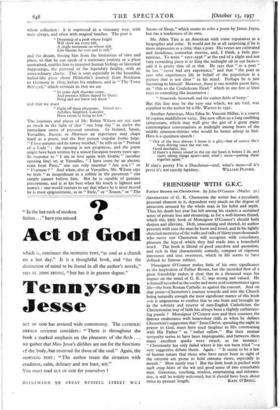FRIENDSHIP WITH G.K.C.
Father Brown on Chesterton. By John O'Connor. (Muller. 5s.)
ADMIRATION of G. K. Chesterton the writer has a peculiarly personal element in it, dependent very much on the degree of attraction aroused by the whole man in his habit and myth. Thus his death last year has left among his readers a sustained sense of private loss and mourning, as for a well-known friend, which this little book of Monsignor O'Connor's should both deepen and alleviate. Deft, unassuming and shrewd, its author presents with ease the man he knew and loved, and in his lightly sketched memories of the walks and talks of thirty years thousands who never saw Chesterton will recognise with consolatory pleasure the lege ad which they had made into a household word. The book is liberal of good anecdote and quotation, and rich in that characteristic comedy, compact of vigorous innocence and true sweetness, which in life seems to have defined its famous subject.
Monsignor O'Connor makes little of his own significance as the inspiration of Father Brown, but the recorded flow of a great friendship makes it clear that in a thousand ways his impact on the mind of G. K. C. was strong and valued. He is himself revealed as the cooler and more acid commentator upon life—the born Roman Catholic as against the convert. And on that point—Chesterton's journey towards and into the Church being naturally enough the most significant matter of this book —is it ungenerous to confess that to one born and brought up in the sobriety and reserve of non-English Catholicism the Chestertonian way of faith has always been a slightly embarrass- ing puzzle ? Monsignor O'Connor now and then counters the famous exuberance with benevolent chill, as when he defines Chesterton's suggestion that," Jesus Christ, spending the night in prayer to God, must have used laughter in His communing with His Father" as "rather callow." But their mutual sympathy seems to have been impregnable, and between them many excellent sparks were struck, as for instance : "Christianity has only failed where it has not been tried "—a very suggestive debate thesis. Again : "It seems to be a law of human nature that those who have never been in sight of the 'extreme are prone to hold extreme views, especially in morals." How neatly true ! But the little book is packed with such crisp hints of the wit and good sense of two remarkable men. Generous, touching, modest, entertaining and informa-
tive, it will be widely welcomed, but it should have been about _






















































 Previous page
Previous page